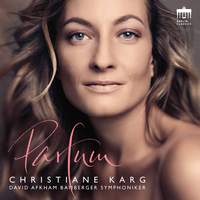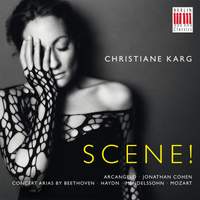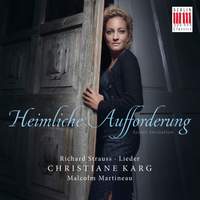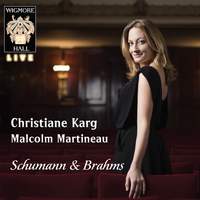Interview,
Christiane Karg on Parfum
 Christiane Karg's new disc of songs by Debussy, Duparc, Koechlin and Ravel (plus a cameo from a young Britten trying out a French accent) is one of my stand-out vocal recitals of the year to date: exploring the importance of fragrance in French Symbolist poetry, it's a collection that's perhaps best described by Baudelaire's memorable phrase (which makes an appearance on the disc in its famous setting by Duparc) 'luxe, calme et volupté'.
Christiane Karg's new disc of songs by Debussy, Duparc, Koechlin and Ravel (plus a cameo from a young Britten trying out a French accent) is one of my stand-out vocal recitals of the year to date: exploring the importance of fragrance in French Symbolist poetry, it's a collection that's perhaps best described by Baudelaire's memorable phrase (which makes an appearance on the disc in its famous setting by Duparc) 'luxe, calme et volupté'.
In between performances as Ginevra in Handel's Ariodante (featuring another recent Presto interviewee, Sonia Prina, as her nemesis Polinesso), Christiane corresponded with me over email about her infatuation with French poetry, the importance of song-repertoire in her career, and a new non-musical project inspired by the disc…
From the sleeve-notes for this disc, I get the impression that this is a project that’s driven by a fascination with the poetry itself – when did you first fall in love with Baudelaire, Verlaine et al (and indeed with the French language)?
The French language has fascinated me for quite some time, and when I started work on Mélisande I felt more and more than I wanted to broaden my French repertoire. One of my main musical interests is Lied-repertoire so it was just a matter of time until I started my research into French song.
How did you settle on the idea of ‘parfum’ as a unifying theme, and why do you think smell was such an important sense for this ‘school’ of French poets?
When you listen to this kind of music you are surrounded by Parfum - something you can’t touch or get a hold on but that moves you deeply. In the very delicate music by Duparc, Koechlin, Debussy and Ravel you can smell the fragrance of nature. Parfum is also a very important word in the poetry I chose for this disc, for example, in Baudelaire: 'O serments, o parfums, o baisers infinis'.
The Britten is the only work on the disc that’s set by a non-Francophone composer (and a very young one at that!) – how does he measure up to the others on the disc, do you think, and do you feel that we already get glimpses of his own emerging style in this very early piece?
Britten composed these songs at the age of 14, based on poems by Victor Hugo and Paul Verlaine. The poetry is the first link to the rest of the works on this disc. Secondly, I am really convinced that his way of composing (at this early stage) fits extremely well with the rest of the compositions: when you first listen to it you will almost think it could be Debussy. Benjamin Britten’s work is very inspiring to me and I am always surprised by his variety of colours and styles. I am not a musicologist and my admiration of his work is not influenced by a scientific approach, but listening to his pieces immediately gives you an impression of his genius as a composer and shows how thoughtful and sensitive he must have been.
Some of the repertoire on this disc (I’m thinking of the Ravel in particular) is often associated with lyric mezzos, and sits a notch or two lower than the Handel and Mozart roles with which you’ve become associated – do you find that this music invites you to explore vocal colours which perhaps don’t get tapped so often in your operatic repertoire?
True. I love playing with all colours of my voice and this is one reason why I love working on Lied. Opera repertoire often puts you in a drawer, as we say in German: because you are singing a certain repertoire you can’t do others. Something I like so much about French music is that the composer often writes: 'pour une voix' = 'For voice'. And does not specify. Everyone who wants and is able to sing is invited to. I love this idea of freedom: every voice has a different approach to a certain repertoire, song or aria and that makes it so interesting.
Can you tell me how French operatic repertoire might figure in your future? You’ve had several great successes as Mélisande, and recently took on Blanche de la Force – any plans to add Concepcion, L’Enfant or Elle (or indeed anything more obscure!) to the list?
I am so much in love with Mélisande and would love to sing Blanche again in the future. Mélisande I will perform at Vienna State Opera next season. More generally, in the next years there will be another step into new roles and I’m curious about where my voice will lead me in the future.
Finally, I heard a rumour that you’re working on the launch of a new fragrance inspired by the repertoire on this disc…can you share any details about that yet?
Besides my artistic work on stage I feel a responsibility to work in the field of music education. I would like to combine the new fragrance that I am working on and the raising of some money to establish my project working with children. The fragrance shall make the connection between our senses to get a deeper feeling whilst listening to music. The idea is to build a relationship between the images you see by reading the poems and the odours and sounds you connect with them. It’s a new world that I’m discovering and I’m very excited about the result as well. More in autumn…
Parfum: Songs by Britten, Debussy, Duparc, Koechlin and Ravel
Christiane Karg (soprano), Bamberger Symphoniker, David Afkham
Parfum was released on Berlin Classics on 21st April.
Available Formats: CD, MP3, FLAC, Hi-Res FLAC
Other recent recordings from Christiane Karg
Scene!: Concert arias by Mozart, Haydn, Beethoven and Mendelssohn
Christiane Karg (soprano), Arcangelo, Jonathan Cohen
'Well planned and superbly executed, with nothing putting Karg beyond her comfort zone, even as she steps into a dramatic fach, which she says is new to her. It’s a wonderfully clear, expressive soprano.' (Record Review)
Available Format: CD
Heimliche Aufforderung: Lieder by Richard Strauss
Christiane Karg (soprano), Malcolm Martineau (piano)
'Her silver-tinged, creamy sound is perfect for Strauss...In sum, one of the best Strauss Lieder recitals ever.' (The Sunday Times)
Available Formats: CD, MP3, FLAC
'She's an expert technician with a lovely bright voice. She is also a responsive, intelligent mood-creator and stylist.' (BBC Music Magazine)
Available Formats: MP3, FLAC
Berg, Strauss, Fauré, Debussy, Poulenc and Wolf
Christiane Karg (soprano), Malcolm Martineau (piano)
'some of the most natural, straightforward Wolf performances I've encountered. So deeply has she embodied the material that she seems to live the songs rather than projecting them as an outside entity. A minor miracle?' (Gramophone)
Available Format: CD







